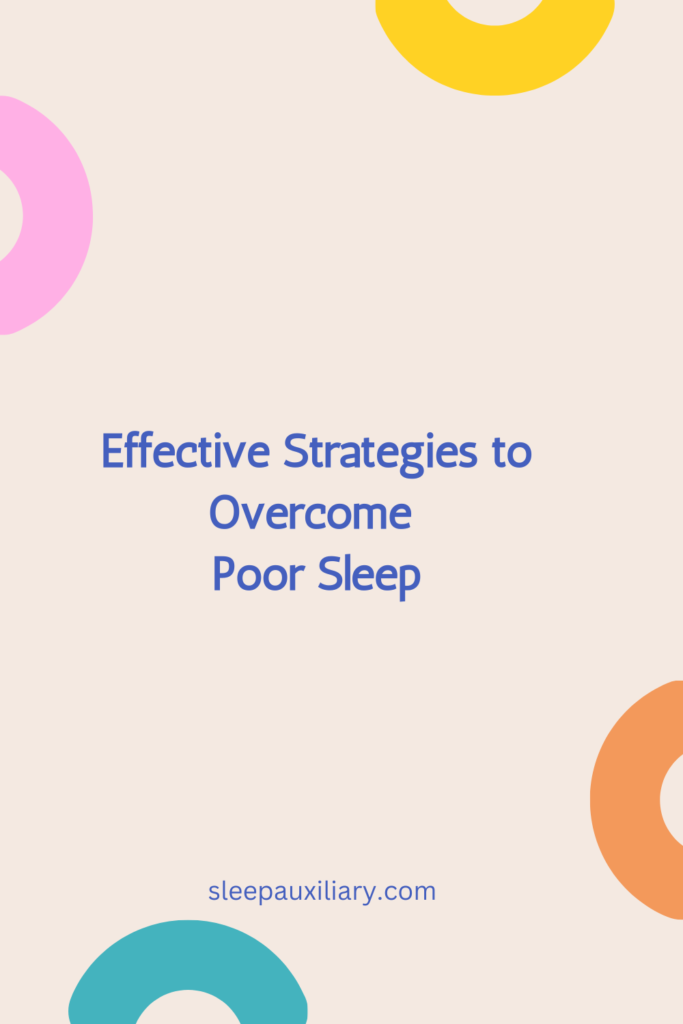Effective Strategies to Overcome Poor Sleep are essential for maintaining overall health and well-being. Poor sleep can drastically affect your daily performance, mood, and long-term health. Despite its importance, many people struggle to achieve quality rest due to various factors, including stress, lifestyle choices, and environmental conditions. This article aims to provide unique and seldom-discussed insights into improving sleep quality naturally, without the need for medications or prescriptions. By focusing on practical, evidence-based strategies, we will guide you through actionable steps to enhance your sleep and, consequently, your overall well-being.
Sleep is often underestimated in its role as a cornerstone of health. Poor sleep can lead to a cascade of negative effects, such as weakened immunity, increased risk of chronic conditions, and impaired cognitive function. For health and well-being enthusiasts, understanding and implementing effective strategies to overcome poor sleep can transform their nightly rest and daily life. Our tips and tricks are designed to be simple, yet powerful, ensuring they fit seamlessly into your routine.
This guide delves into often-overlooked areas that can significantly impact sleep quality. We will explore the nuances of stress management, the impact of diet and exercise, and the importance of creating a conducive sleep environment. Additionally, we will provide detailed reviews of sleep products, helping you make informed decisions tailored to your specific needs.
By addressing the root causes of poor sleep and offering comprehensive solutions, we empower you to take control of your sleep health. Whether you’re struggling with occasional sleepless nights or chronic insomnia, these effective strategies to overcome poor sleep will equip you with the knowledge and tools to achieve better rest and enhance your overall quality of life.
Table of Contents
Understanding the Causes of Poor Sleep

To effectively address poor sleep, it’s crucial to understand the underlying causes. Various factors can disrupt sleep quality, ranging from emotional stress to environmental conditions. Identifying these factors can help in crafting targeted strategies to improve sleep.
Stress and Anxiety
Stress and anxiety are significant contributors to poor sleep. When your mind is preoccupied with worries, it becomes difficult to relax and fall asleep. The body’s natural response to stress—elevated cortisol levels—can also interfere with the sleep-wake cycle.
- Practice mindfulness meditation to calm the mind.
- Engage in deep breathing exercises before bed.
- Keep a journal to offload worries and clear your mind.
Poor Sleep Habits
Bad sleep habits can severely impact sleep quality. Irregular sleep schedules, excessive screen time, and consuming caffeine or heavy meals close to bedtime are common culprits.
- Maintain a consistent sleep schedule, even on weekends.
- Limit screen time at least an hour before bed.
- Avoid caffeine and heavy meals in the evening.
Environmental Factors
Your sleep environment plays a crucial role in determining the quality of your sleep. Factors such as noise, light, and room temperature can significantly impact your ability to fall and stay asleep.
- Ensure your bedroom is dark, quiet, and cool.
- Use blackout curtains to block external light.
- Consider white noise machines to mask disruptive sounds.
By addressing these common causes of poor sleep, you can lay a strong foundation for better rest. Each factor requires specific adjustments, but together, they create a comprehensive approach to improving sleep quality. Understanding the root causes helps in implementing effective strategies to overcome poor sleep, ensuring long-term benefits for your health and well-being.
Effective Strategies to Overcome Poor Sleep
Implementing effective strategies to overcome poor sleep can drastically enhance your overall well-being. This section explores practical and natural methods to improve sleep quality, ensuring you wake up refreshed and ready for the day.

Establishing a Bedtime Routine
A consistent bedtime routine signals your body that it’s time to wind down and prepare for sleep. Engaging in relaxing activities before bed can help transition your mind and body into sleep mode.
- Read a book: Choose calming literature to avoid stimulating your mind.
- Stretching exercises: Gentle stretches can ease muscle tension and promote relaxation.
- Meditation: Practice mindfulness or guided meditation to clear your mind of daily stress.
Optimizing Your Sleep Environment
Creating an optimal sleep environment is essential for quality rest. Ensure your bedroom is conducive to sleep by controlling light, noise, and temperature.
- Keep the bedroom dark, quiet, and cool: Use blackout curtains and white noise machines to create a perfect sleep sanctuary. Learn more about optimizing sleep conditions.
- Invest in quality bedding: A comfortable mattress and supportive pillows tailored to your sleeping position can make a significant difference.
Mindfulness and Relaxation Techniques
Incorporating mindfulness and relaxation techniques into your routine can help manage stress and anxiety, which are major sleep disruptors.
- Deep breathing exercises: Practice techniques like 4-7-8 breathing to calm your nervous system.
- Progressive muscle relaxation: Sequentially tensing and relaxing muscle groups can reduce physical tension.
- Visualization: Imagine a peaceful and relaxing scene to divert your mind from worries.
These strategies not only address the symptoms of poor sleep but also tackle the root causes. For a comprehensive guide to improving sleep quality, including tips on diet, exercise, and sleep schedules, check out this helpful article.
By adopting these effective strategies to overcome poor sleep, you can create lasting habits that promote better sleep hygiene and overall health. Whether you’re dealing with occasional restlessness or chronic sleep issues, these practical tips will help you achieve a more restful and rejuvenating sleep.
Lifestyle Changes for Better Sleep

Making thoughtful lifestyle changes can significantly improve your sleep quality. Beyond common advice, integrating unique and often overlooked practices into your daily routine can create lasting improvements in how well you rest each night.
Diet and Nutrition
What you eat plays a crucial role in your sleep patterns. While many know to avoid caffeine, there are other dietary considerations that can enhance sleep quality.
- Incorporate sleep-friendly foods: Foods rich in magnesium, like leafy greens, nuts, and seeds, help relax muscles and promote sleep.
- Consume complex carbohydrates: Whole grains, such as oats and brown rice, can increase serotonin levels, aiding in sleep onset.
- Limit high-sugar foods: High sugar intake can lead to energy spikes and crashes, disrupting sleep patterns.
Physical Activity
Regular physical activity is well-known to improve sleep, but the timing and type of exercise can make a difference.
- Engage in morning workouts: Exercising in the morning can help set your circadian rhythm, making it easier to fall asleep at night.
- Opt for moderate exercise: Activities like yoga or brisk walking can be beneficial without overstimulating your body close to bedtime.
- Consider outdoor exercise: Exposure to natural light during outdoor workouts can help regulate your sleep-wake cycle.
Reducing Screen Time
The blue light emitted by screens can interfere with melatonin production, but reducing screen time involves more than just avoiding electronics before bed.
- Create tech-free zones: Designate certain areas of your home, such as the bedroom, as tech-free zones to encourage relaxation.
- Implement screen breaks: Take regular breaks from screens throughout the day to reduce overall exposure.
- Use blue light filters: Apply blue light filters on devices if evening screen use is unavoidable, to minimize disruption to your sleep cycle.
By adopting these unique lifestyle changes, you can significantly enhance your sleep quality. Embracing a holistic approach that includes diet, exercise, and mindful screen use will help you implement effective strategies to overcome poor sleep. These often overlooked practices can make a substantial difference, ensuring you achieve restful and rejuvenating sleep.
Long-Term Strategies for Sustained Sleep Improvement
To maintain consistent sleep quality, it’s essential to implement long-term strategies that go beyond immediate fixes. These strategies will help ensure sustained improvement in your sleep health.

Sleep Hygiene Practices
Good sleep hygiene is fundamental for sustained sleep improvement. Adopting habits that support healthy sleep patterns can have lasting benefits.
- Maintain a regular sleep schedule: Go to bed and wake up at the same time every day, even on weekends.
- Create a pre-sleep ritual: Engage in calming activities like reading or taking a warm bath to signal your body that it’s time to wind down.
- Avoid stimulants: Reduce intake of caffeine, nicotine, and alcohol, especially in the hours leading up to bedtime.
Monitoring Sleep Quality
Tracking your sleep can provide valuable insights into patterns and areas for improvement. Regular monitoring helps identify what works and what needs adjustment.
- Use a sleep journal: Record your sleep times, wake times, and any factors that might have affected your sleep.
- Utilize sleep tracking apps: Modern technology offers various apps that monitor sleep cycles and provide detailed feedback.
- Pay attention to sleep metrics: Focus on metrics such as sleep duration, sleep efficiency, and wakefulness to gauge your sleep quality.
Seeking Professional Help
If sleep issues persist despite your efforts, it might be time to seek professional help. Sleep specialists can diagnose and treat underlying conditions that may be affecting your sleep.
- Consult a sleep specialist: A professional can provide a thorough evaluation and recommend treatments such as cognitive-behavioral therapy for insomnia (CBT-I).
- Explore sleep clinics: These facilities offer in-depth sleep studies to identify disorders like sleep apnea and restless leg syndrome.
- Follow professional guidance: Adhering to the treatment plan provided by a specialist can lead to significant improvements in sleep quality.
Implementing these effective strategies to overcome poor sleep will help you achieve long-term, sustained improvement in your sleep health, ensuring you consistently enjoy restful and rejuvenating nights.
Conclusion
Improving your sleep quality is a journey that involves understanding the root causes of poor sleep and implementing effective, long-term strategies. By addressing stress, poor sleep habits, and environmental factors, and by making conscious lifestyle changes, you can significantly enhance your sleep health. As you embark on this journey, remember that creating a sustainable sleep routine requires consistency and patience.

To summarize the key points covered in this article:
- Understand the Causes: Identifying stress, poor sleep habits, and environmental factors is crucial for improving sleep.
- Implement Effective Strategies: Establish a bedtime routine, optimize your sleep environment, and practice mindfulness and relaxation techniques.
- Adopt Lifestyle Changes: Focus on diet, physical activity, and reducing screen time to promote better sleep.
- Pursue Long-Term Solutions: Maintain good sleep hygiene, monitor your sleep quality, and seek professional help if necessary.
A well-rounded approach to sleep improvement not only addresses immediate issues but also ensures lasting benefits. As noted in the linked article from HelpGuide, “Maintaining a regular sleep schedule and creating a conducive sleep environment can lead to better, more refreshing sleep”. By following these comprehensive tips and strategies, you can overcome poor sleep and enjoy the profound benefits of restorative rest.
Embrace these effective strategies to overcome poor sleep, and you will find yourself waking up more refreshed, energized, and ready to tackle each day with renewed vigor. Remember, investing in your sleep is investing in your overall health and well-being.





